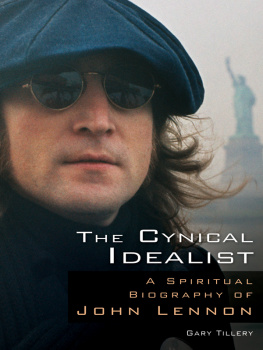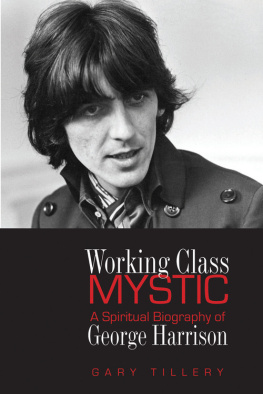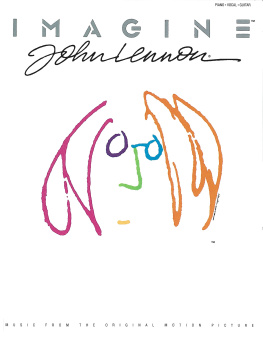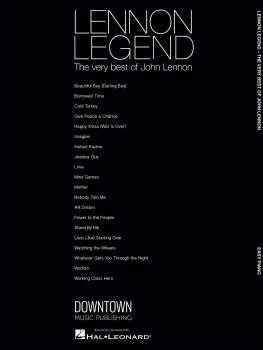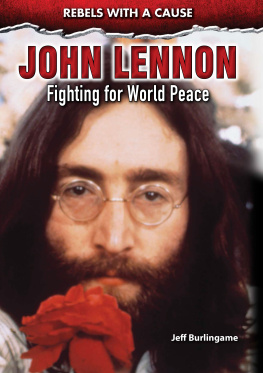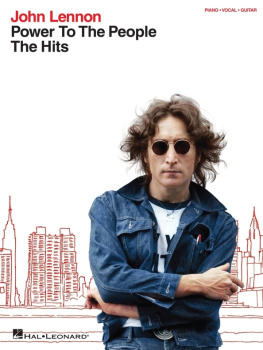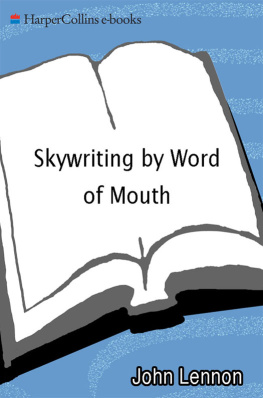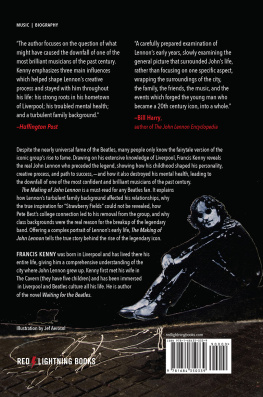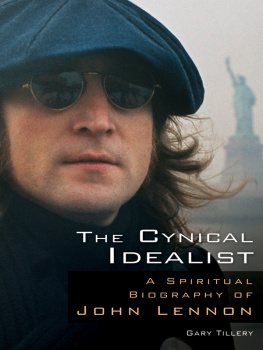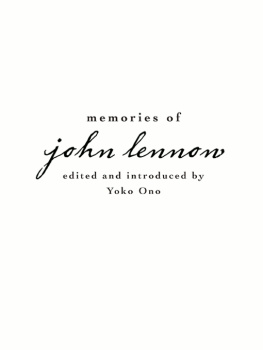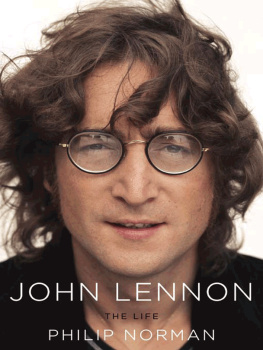THE CYNICAL IDEALIST

Highlight of an innovative peace campaign. John Lennon and Yoko Ono confer with Canadian Prime Minister Pierre Trudeau, December 23, 1969.
THE CYNICAL IDEALIST
A SPIRITUAL BIOGRAPHY OF
JOHN LENNON
GARY TILLERY

Learn more about Gary Tillery and his work at www.garytillery.com
Find more books like this at www.questbooks.net
Copyright 2009 by G. G. Tillery, L.L.C.
First Quest Edition 2009
Quest Books
Theosophical Publishing House
PO Box 270
Wheaton, IL 60187-0270
Without limiting the rights under copyright reserved above, no part of this publication may be reproduced, stored in or introduced into a retrieval system, or transmitted, in any form, or by any means (electronic, mechanical, photocopying, recording, or otherwise), without the prior written permission of the publisher of this book.
The scanning, uploading, and distribution of this book via the Internet or via any other means without the permission of the publisher is illegal and punishable by law. Please purchase only authorized electronic editions, and do not participate in or encourage electronic piracy of copyrighted materials.
While the author has made every effort to provide accurate telephone numbers and Internet addresses at the time of publication, neither the publisher nor the author assumes any responsibility for errors or for changes that occur after publication. Further, the publisher does not have any control over and does not assume any responsibility for author or third-party websites or their content.
Cover photo Bob Gruen / www.bobgruen.com
Cover design by Kirsten Hansen Pott
Every effort has been made to contact and acknowledge rights holders for all quotations beyond fair use. We apologize for any unintentional errors or omissions and will correct them in future editions of this book.
Photo: Pierre Elliott Trudeau, John Lennon, and Yoko Ono
Library and Archives Canada. Reproduced with the permission of Library and Archives Canada. Source: Library and Archives Canada/Credit: Duncan Cameron/Duncan Cameron fonds/PA-175744
Library of Congress Cataloging-in-Publication Data
Tillery, Gary.
The cynical idealist: a spiritual biography of John Lennon / Gary Tillery.1st Quest ed.
p. cm.
Includes bibliographical references.
ISBN 978-0-8356-0875-6
1. Lennon, John, 1940-1980Religion. 2. Lennon, John, 1940-1980Philosophy. 3. Rock musiciansBiography. I. Title.
ML420.L38T55 2009
| 782.42166092dc22 | 2009025756 |
[B]
ISBN for electronic edition, e-pub format: 978-0-8356-2026-0
6 5 4 * 12 13 14 15 16
Dedicated to
Aung San Suu Kyi
for her long struggle
to bring light
AUTHORS NOTE
I t would be foolish not to let John Lennon provide the soundtrack to a book about his creativity and thought. Certain songs stand out as key moments in the development of his philosophy and need to be discussed, but song lyrics lose their magic when freeze-dried and printed on a page. The written form will never be able to convey the nuancesfor example, the pathos in Lennons performances of Mother and Cold Turkey, or the dark irony of hearing Help! delivered at an exuberant tempo. The key songs addressed in the text are listed at the end of each major section of this book and you are encouraged to listen to them.
ACKNOWLEDGMENTS
I would like to thank the authors whose research into John Lennons life and work gave me a rich mine to work in the creation of this book. Deserving of special mention is Jon Wiener, whose long struggle to obtain government documents through the Freedom of Information Act (aided by the American Civil Liberties Union) should be applauded by all admirers of Lennon. While I didnt discover Wieners Come Together and Gimme Some Truth until I was more than half-finished with this work of my own, I found his biographical material and retrieved documents particularly helpful in analyzing Lennons views and activities during the years 197075.
I would also like to express my gratitude to the dearly missed Richard Lerner for his insightful comments on the first draft, to Seymour Shlaes and Will Marsh for their excellent editing, and to Sharron Dorr, Idarmis Rodriguez, and Nancy Grace at Quest Books for their diligent efforts to make this a better work.
INTRODUCTION
T he catalyst that transformed this book from a daydream into a serious project was the reply to a question posed to a couple of college students. I happened to ask how John Lennon was perceived these days. Their response: of course he was well known as one of the Beatles, butas with all pop superstarshe probably didnt deserve the level of fame he enjoyed.
Time may be clouding the image of John Lennon. If subsequent generations feel free to categorize him as just another celebrity, they need to be reminded of how extraordinary a person he was.
At the close of the 1960s, this pop superstar was recognizedin the company of world statesmen John F. Kennedy and Ho Chi Minhas a Man of the Decade. Lennon was the first rock star ever to hold an issue-oriented meeting with the leader of a nation. His opinion was so influential that an offhand comment during an interview in England sparked religious demonstrations across America. In fact, Lennon was such a highly regarded figure that when he moved to the United States from England Attorney General John Mitchell, Republican Senator Strom Thurmond, and the heads of the FBI, the CIA, and the Immigration and Naturalization Service all worked in concert to attempt to deport him in advance of the 1972 presidential campaign. Nor did his influence end with his death; some of the songs he wrote as a pop superstar are considered so politically charged that they still get removed from airplay at times of crisis.
However, this book is not a panegyric. John Lennon had his share of faults, as anyone who has read about him knows very well. For much of his life he overindulged in alcohol and drugs, tended to be abusive both verbally and physically, and existed in a self-centered fog that left him inconsiderate of the feelings of those around him. What he expressed as the chip on my shoulder thats bigger than my feet was mainly the result of a troubled youth, and to his credit Lennon frankly admitted his own defects in interviews (his passion for truth distinguishing him from almost all of his contemporary celebrities).
Although he was far from being a paragon, what deserves admiration is the tenacity with which he struggled to become one. He never gave up trying to transcend the type of person he had grown into and become something better. He kept reaching toward the ideal and along the way he left a string of creative achievements that resonate with others who struggle to improve.
This book focuses on those creative achievements, as well as on Lennons comments and revelations in interviews. The purpose is to discover in them the underlying structure of his worldview and to present, in an orderly fashion, the insights he drew from life, the values he found important, and the principles he came to espouse. In short, it is an attempt to summarize the philosophy by which John Lennon lived.
The word philosophy is laden with the weight of twenty-five hundred years. We find it difficult to use without mentally conjuring the Wise Old Heads of historyfrom Plato to Kant to Sartre. We picture them musing about how to define reality and leaving us with exhaustively reasoned frameworks for understanding the Truth. Unfortunately, we often feel that it takes an IQ of three hundred to understand those frameworks.
Next page
